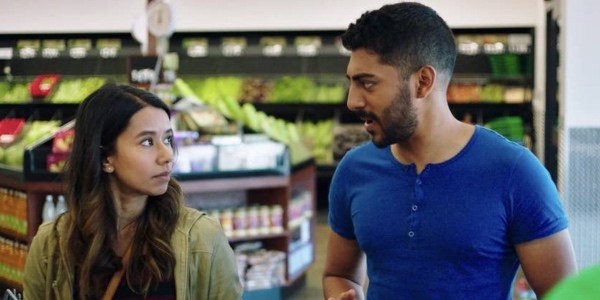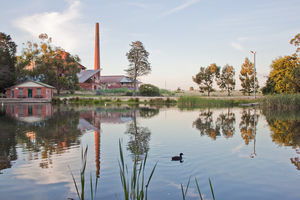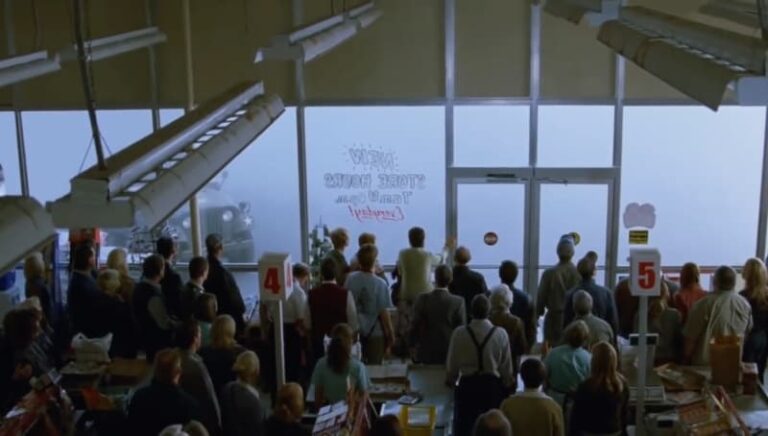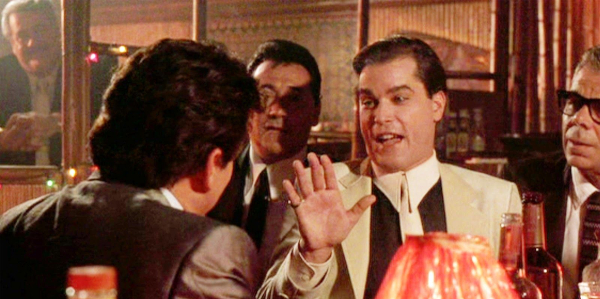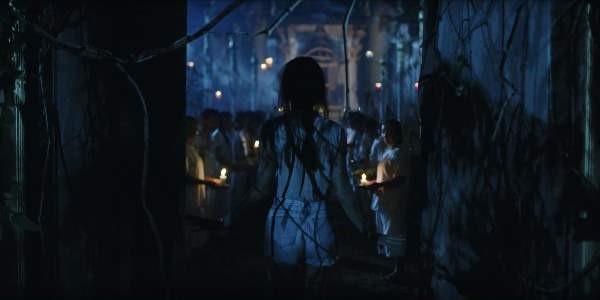Queerly Ever After #38: THE FALLS TRILOGY (2012, 2013, 2016)
Queerly Ever After is a bi-monthly column where I take a look at LGBT+ films that gave their characters a romantic happily-ever-after. There will be spoilers. Also, don’t forget to buy your Queerly Ever After merch right here.
Continuing with the theme from my last entry, Latter Days, is Jon Garcia’s The Falls trilogy (The Falls, The Falls: Testament of Love, and The Falls: Covenant of Grace), about two Mormon missionaries who fall in love. The trilogy follows them from their time together as missionaries, through their twenties, and ends with them finally getting married.
Part I
The first movie introduces us to Elder RJ Smith (Nick Ferrucci) and Elder Chris Merril (Benjamin Farmer), young men around twenty who are paired as mission companions in Portland. As the two grow closer together they begin to fall in love, and eventually, start having sex. The more they fall in love, the less time they spend tending to their mission work. Instead, they spend their days with each other and hanging out with Rodney (Brian J. Saville Allard) a veteran with PTSD whom they initially tried to convert, but befriend instead. Of course, their secret is eventually found out when their mission leader, Elder Harris (Quinn Allan) walks in on them in bed together.
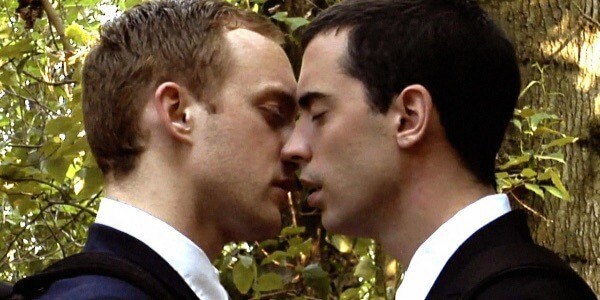
After being caught, their paths diverge greatly, RJ is sent home to face the quorum, while Chris, whose father is a very high ranking church member, is allowed to stay on his mission as long as he promises not to have relations with any more men. RJ realizes that he can’t go back into the closet and decides to sever his ties with the church, though he does not officially get excommunicated. An interesting parallel to Latter Days is that the parents in this movie are not heinous people. RJ’s father, Thomas (Harold Phillips), while it takes him some time to process, is actually very supportive of his son. In fact, both RJ’s parents and his younger sister stand by him no matter what, even if it means he no longer follows their religion. The second movie introduces us more to Chris’ family and his upbringing, which is not as supportive and open as RJ’s.
Of the three films, the first one is definitely the weakest in production-value and acting-wise. By the second film, the sound mixing and camerawork become much better, and the actors also seem to come into their own more. While the third movie is most technically the best, the second one is actually the most interesting. There is one choice the filmmaker made over and over again I have to point that out bugged me. Whenever there was a scene in which one of the leads talked to another character, who was not a main character in the movie, like when RJ and Chris did their mission work, or any scene involving RJ, Chris, or Thomas talking to church council members, the camera never shows us the person to whom they are speaking; you just hear their voice.
Part II
As I mentioned, the second film, The Falls: Testament of Love, delves more into Chris’ life. We learn that after the events in Portland, at his father Noah’s (Bruce Jennings) urging, Chris entered some sort of conversion therapy program, completed it, and devoted his life to being a good Mormon. Now, five years after his relationship with RJ, he met a woman named Emily (Hannah Barefoot), married her, and then the two had a daughter. RJ on the other hand moved to Seattle, is no longer a practicing Mormon, and lives with his boyfriend, Paul (Thomas Stroppel). RJ and Chris have not seen or spoken to each other since they took a road trip across the country a couple of years prior. Of course that all changes when they receive word that their friend Rodney has passed away and they are both invited to the funeral.
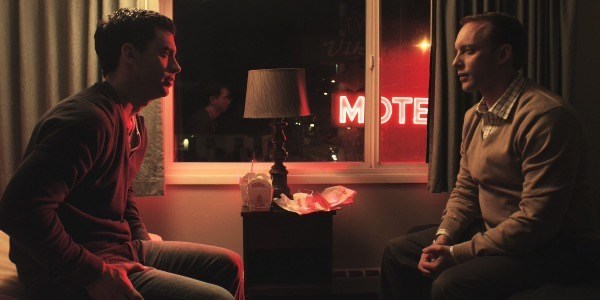
Seeing each other again stirs up old feelings that never got closure, so RJ decides to take a trip out to Utah, purportedly to write about something for the magazine he works at, but really so he can see Chris again and finally get closure. Of course, instead of getting closure, they fall right back into bed with each other. After Chris’s wife Emily sees the two of them kiss, he realizes that he can no longer live like this. He invites his parents, brother, and sister over to his house, as well as RJ, to announce that he and Emily are getting divorced and that he is in love with RJ. As expected, Noah, who believed this part of his son’s life was “behind him” is none too pleased with this development, but Chris’s mom Debbie (Mercedes Rose) comes around.
Part III
And finally, there’s the last film in the trilogy, The Falls: Covenant of Grace. Set a year after the events of Testament of Love, RJ is a successful writer living in Portland, while Chris is still living in Salt Lake City with his daughter, and applying to law schools. Although he is no longer closeted, Chris is still an active member of the church, while RJ is not. The two have been in an on-again-off-again holding pattern since the end of the previous film. While they both love each other, they haven’t been able to reconcile their conflicting views on faith and the literal distance between them. While RJ misses the church in many ways, he can’t see how there is any place for men like him and Chris in it, especially when it is announced that children of gay Mormon couples will not be baptized in the church.
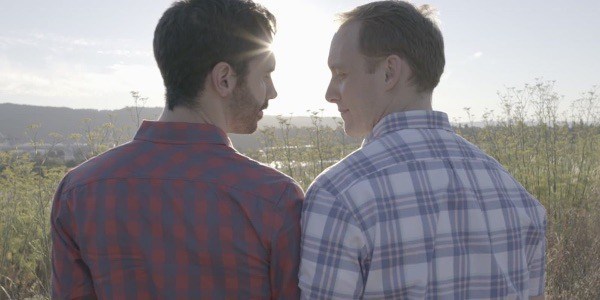
And then death strikes again. This time, Chris’s mom dies. RJ, along with his father, Thomas, fly out to Salt Lake to attend her funeral and pay their respects. It is then, that Chris’s father, Noah, finally comes to realize how much Chris and RJ love each other, but he can’t understand why, despite their feelings for each other, they aren’t officially together. He decides, that as a high-ranking church member, he will try to change the church’s stance on baptizing the children of gay couples. While he ultimately fails in changing the church’s stance, he does tell Chris that regardless of that, he will support him. Finally, Chris and RJ are able to figure out a brand of Mormonism that works for them, and RJ relocates to Salt Lake City.
In Conclusion: The Falls Trilogy
The Falls trilogy is an interesting film series to watch. While the technical filmmaking gets better as the movies progress, the second film has the most interesting and well-developed storyline. The third actually feels the weakest story-wise; at 2 hours long, it sort of meanders to its eventual conclusion. Unfortunately, after the first two films, the conflict of the third never feels as great, nor is there as much a sense of urgency. Quite possibly, editing out some of the weight of the third film would likely have strengthened it.
The Falls was released in 2012, with the following sequels coming out in 2013 and 2016.
Does content like this matter to you?
Become a Member and support film journalism. Unlock access to all of Film Inquiry`s great articles. Join a community of like-minded readers who are passionate about cinema – get access to our private members Network, give back to independent filmmakers, and more.
Join now!
